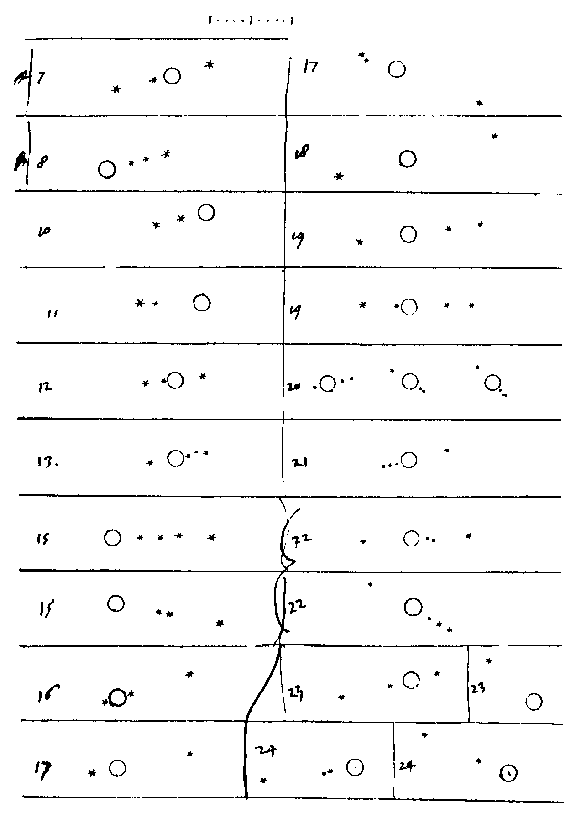Galileo and Orbits
Galileo and Orbits
Galileo the Astronomer
The Telescope  an interesting invention. Its importance lies in demonstrating that, through instrumentation, one can observe things
with far more precision and depth than can be attained using only human
senses. The Universe became a whole lot larger.
an interesting invention. Its importance lies in demonstrating that, through instrumentation, one can observe things
with far more precision and depth than can be attained using only human
senses. The Universe became a whole lot larger.
But here is Galileo's sales pitch on this new invention (in the year 1608):
This is a thing of inestimable benefit for all transactions
and undertakings, maritime or terrestrial, allowing us at sea to discover at a much greater
distance than usual the hulls and sails of the enemy, so that for 2 hours and more we
can detect him before he detects us.
|
(Research is still frequently funded this way).
Galileo's first set of documented nighttime observations were on November 30, 1609,
when he pointed the telescope at the moon.


With his Telescope
Galileo
discovered that the celestial objects were marred by imperfections (oh say it ain't
so) -- (by late 1610 these observations
could and were reproduced by others):
- That the moon was non-uniform and had blemishes. Other observers could
reproduce this result:

- That the sun had spots
- That venus showed phases
- That there were a lot more stars out there than could be seen
with the naked eye
 Why
was this an important discovery?
Why
was this an important discovery?
- That saturn had something wrong in its appearance.
- That Jupiter had 4 moons in orbit about it
Galileo's observations of the satellites of Jupiter

This is the most important set of observations made by Galileo.
He did this in January of 1609 and in a mere 15 nights of observing
(interrupted by two completely cloudy nights) he deduced that Jupiter
had 4 objects in orbit about it.
He published this result on March 13, 1609.
Well of course this was unsettling and a threat to institutions/ideas that supported our special place in the Universe. Some other notables, clergy, etc
looked through the telescope and pretended not to see the moons. Some
refused to look through the telescope.
One scientist of the day summed the situation up as follows:
These satellites of Jupiter are invisible to the naked eye, and therefore exercise
no influence on the Earth, and therefore would be useless and therefore do not
exist.
Wow ...
The history of Galileo vs the Catholic Church is a fascinating one because there
is still controversy remaining as to the church's stance on science and Galileo's
responsibility for getting arrested. From the Catholic
Church point of view, several church figures supported science and improved upon Galileo's findings (indeed there were clergy who
supported Copernican theory and Galileo) and of course there were several who
condemned Galileo and his work. But they do paint Galileo as an ambitious and
obnoxious individual who was basically an ass to his Church supporters and less mentally gifted
than the Jesuit astronomers who argued with him. And after bruising a few more egos
in the church, Galileo lost a lot of support, including Pope Urban who also
originally did support him but not the Copernican Universe. The Pope
wanted him to speak about other cosmologies - only known to god (and the pope - how convenient)
that were responsible for the observations.
Of course, this isn't science and Galileo wasn't having it. The events leading to his arrest occurred because he provoked the Church with his personality. Galileo probably didn't have the best people skills and he also didn't
have "the why" behind observed phenomena. However, the
real issue here is that the Church was picking which data to follow and not follow.
The data demonstrated that other objects such as Jupiter are orbited by smaller objects forming their own mini solar system.
Thus, the Earth couldn't be at the center of the Universe.
A copernican Universe wasn't perfect, but it was much better than the Brahe model.
Bottom line:
You always go by the observations. It is what it is until better data come along to prove or disprove it.
 an interesting invention. Its importance lies in demonstrating that, through instrumentation, one can observe things
with far more precision and depth than can be attained using only human
senses. The Universe became a whole lot larger.
an interesting invention. Its importance lies in demonstrating that, through instrumentation, one can observe things
with far more precision and depth than can be attained using only human
senses. The Universe became a whole lot larger.



